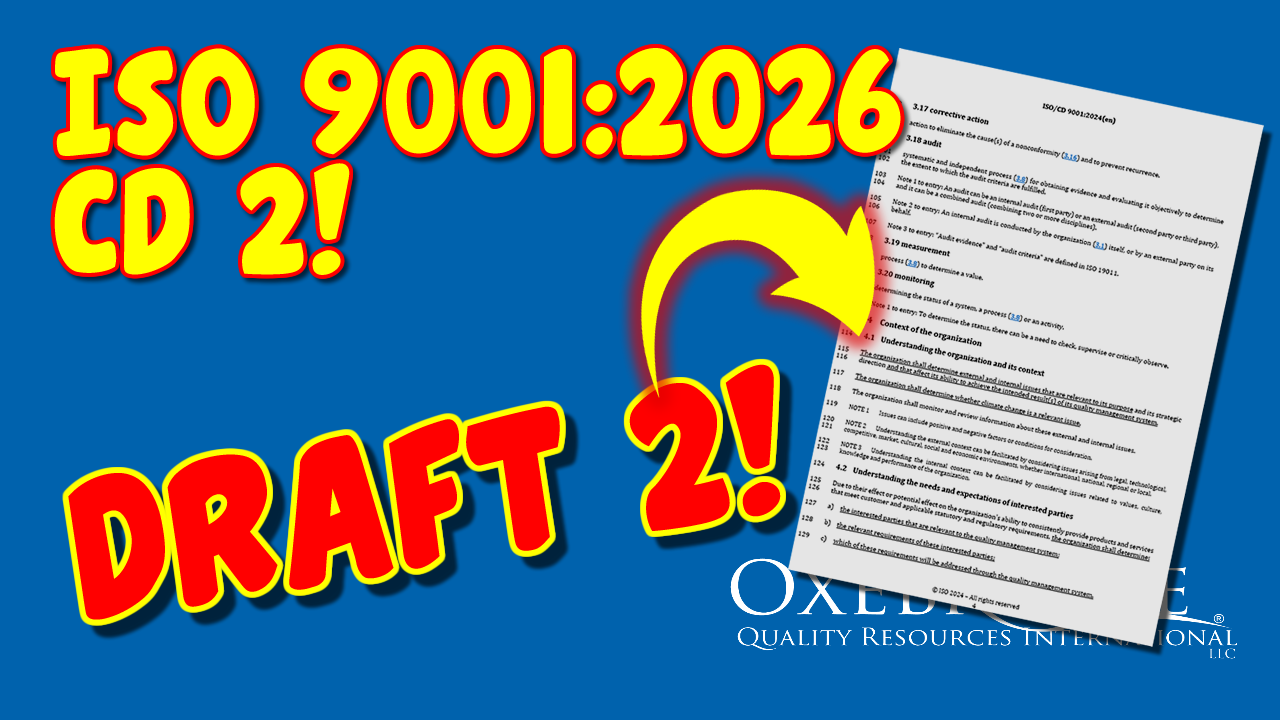Winter Haven FL — In a surprising turn of events, Oxebridge has received a written and formal reply to a complaint sent to SGS, despite an original refusal by the registrar’s senior management to process the matter. The original complaint was submitted to SGS on November 16th, 2010, and resulted in an angry phone call on November 18th by SGS Accreditation Director Zachary Pivarnik, who called the complaint “an inquisition” and said “I am not responding to a consultant” while accusing Oxebridge of trying to paint SGS as “a liar” organization.
Oxebridge VP Operations Christopher Paris then asked for access to SGS’ Impartiality Committee in order to bring cooler heads to bear, but Mr. Pivarnik refused to give that information as well. Impartiality Committees are required by ISO 17021, the accreditation rules under which SGS operates, just for such situations. The positions by SGS appeared to have stood fast until Oxebridge filed a formal complaint with ANAB, citing 11 violations of ISO 17021, including a number regarding Mr. Pivarnik’s refusal to grant access to the Impartiality Committee. That complaint was filed on December 8th.
Then on February 1st, without any previous notice, SGS suddenly sent a closed “Continual Improvement” report to Oxebridge, dated Nov. 29th, ten days after the phone call by Mr. Pivarnik, but prior to the filing of Oxebridge’s complaint to ANAB. The “CI” report was filed and then subsequently validated and closed by Mr. Pivarnik himself, although others within SGS were assigned the investigation and corrective actions.
However, the SGS CI report failed to address Oxebridge’s complaint, which asked for investigation of how erroneous audit findings were being passed onto clients and not caught and corrected by the registrar’s review committee. SGS instead investigated an issue surrounding transitioning clients to ISO 9001:2008.
ANAB’s Rapid Turnaround
In an even more curious move, ANAB then alerted Oxebridge only 24 hours after SGS’ mailing that it had closed complaint #368 against SGS, without action, on the basis of Mr. Pivarnik’s response to Oxebridge.
“The timing is disconcerting,” Mr. Paris said. “It would appear that ANAB and SGS were working behind the scenes and coordinating a response. Either that, or ANAB was able to process an 11-count allegation against a major registrar in less than a day.”
Oxebridge alerted both SGS and ANAB that in its opinion, the SGS complaint failed to address the issue of investigating its internal audit review committee’s actions, and that it considers the matter still open. Oxebridge simultaneously rebuked the closure of ANAB’s file, asking it to reopen the complaint and to review Oxebridge’s complaints in detail.
“Normally,” Mr. Paris said, “we are alerted as to the processing of the ANAB complaint, given a point of contact, and given periodic updates. That’s part of ANAB’s own procedures. In this case, we received a single email from Randy Daugherty closing the matter at the end, and that was it.”
Ironically, Oxebridge has learned that the SGS auditor had already voided the finding that triggered the first complaint. However, the SGS CI report fails to mention this fact, and instead mis-states that SGS “accepted the [corrective] actions” of the client, rather than indicating it was SGS that had voided its original finding. “It would appear that SGS may have actually followed all the rules, but they just did not want anyone to know an auditor had made a mistake and they had to step in and retract a finding,” Mr. Paris said. “If they had just indicated this from the beginning, there would never have been a problem, and this never would have gone to ANAB’s desk.”
The fact that the SGS CI report includes mis-statements about its true corrective actions could cause further problems for the registrar, if ANAB continues to investigate. Accreditation rules require that corrective action plans be properly documented, not allowing for erroneous information.
Relationship with ANAB
Mr. Paris is “disheartened” by ANAB’s 24-hour response and closure. “If ANAB had simply read the original complaint and compared it against the SGS response, it would have seen that the issues were entirely unrelated,” said Mr. Paris. “Unfortunately, this raises new questions about ANAB, and how it conducts its investigations.”
Oxebridge has been a strong supporter of ANAB and an outspoken fighter against unaccredited registrars. It has helped ANAB a number of times in the past, assisting ANAB in protecting its trademark and brand when unaccredited registrars used its logo without permission. In 2009, it provided ANAB with information on registrar QSI Auditing and Certification Services which was using the ANAB logo despite having been de-listed as an ANAB accredited registrar. During a series of speeches given to ASQ branches on the decline of ISO 9001 in the US, Mr. Paris referred to ANAB’s VP Randy Daugherty as “the one man who can save ISO 9001.”
“I truly hope this doesn’t spoil what has been a good relationship, and hopefully ANAB will take a second look at the documents,” Mr. Paris said. “They have to ask themselves, if an ISO 9001 registered firm did what SGS did, by first refusing a complaint, insulting its customer, then processing the wrong issue entirely, that company would be issued a very severe nonconformity. An ISO 9001 end user company could lose its certification over such a move, and no doubt ANAB would support that. But here we have the exact same rules being broken by an accredited registrar, and ANAB is the only authority left to step in. If they fail, then it puts the validity of international accreditation at risk. Registrars have to understand that they are not above the rules. They are not judges, they are suppliers, and the end users are their customers. And ANAB has to accept its role as the top cop, rather than a peacemaker protecting its market.”
Oxebridge is asking that ANAB continue its investigation into how Mr. Pivarnik could refuse access to SGS’ impartiality committee, and maintains that about 5 or more of the original 11 violations cited against SGS remain valid and open. ANAB’s only response to date has been that it “will make note of this to look into during the next office assessment of SGS.”
If ANAB fails to respond, Oxebridge will be left with no further escalation authority. “The next higher body is the IAF, and Randy Daugherty is its President. Randy, for whom I have the greatest respect, was nevertheless also the key point of contact on complaint 368, so asking him to investigate himself is impossible.”
Oxebridge faced similar problems in years past, once when it filed a complaint against auditor training organization RABQSA, and then escalated the complaint to Australian accreditation body JAS-ANZ, but never heard back. A complaint against registrar BSI was escalated to both ANAB and SCC, BSI’s Canadian accreditation body, but SCC dropped the matter, deferring the matter solely to ANAB, indicating it did not want to do “double work”, even though SCC has a separate responsibility under IAF to manage its accredited registrars and maintain the validity of its own accreditation mark.
“In both cases, the accreditation bodies simply ignored their international responsibilities under multilateral agreements,” Mr. Paris said. “When the accreditors stop doing their job, it’s a dead end,” Mr. Paris said. “Anything higher up is just a peer-reviewed group, without any oversight or teeth, and no one has ever won a complaint against an accreditation body.”
Christopher Paris is the founder and VP Operations of Oxebridge. He has over 35 years’ experience implementing ISO 9001 and AS9100 systems, and helps establish certification and accreditation bodies with the ISO 17000 series. He is a vocal advocate for the development and use of standards from the point of view of actual users. He is the writer and artist of THE AUDITOR comic strip, and is currently writing the DR. CUBA pulp novel series. Visit www.drcuba.world







